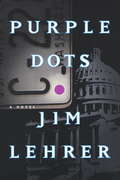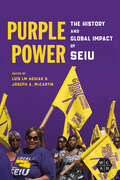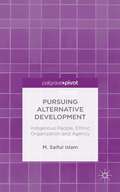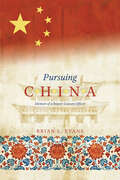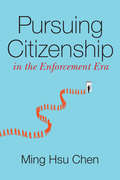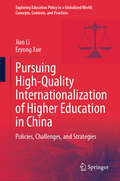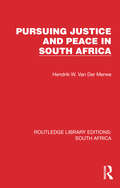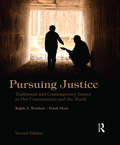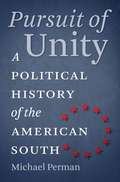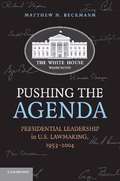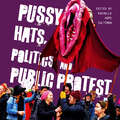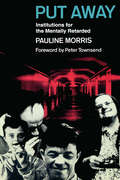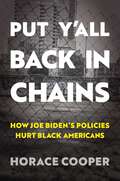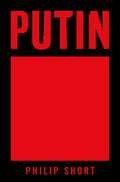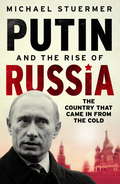- Table View
- List View
Purple Dots
by Jim LehrerWashington, D.C., is a town full of powerful people with powerful, often conflicting agendas, and no one knows this better than Jim Lehrer, the preeminent capital newscaster and novelist. His new book is a witty, provocative political mystery about power play and favor swapping at the highest levels of government, written with his own unique blend of political savvy and irreverent humor. Joshua Bennett has just been nominated by the president to be the new director of the CIA. He's the ideal candidate, and everyone agrees his confirmation hearing should be a mere formality. But this is Washington, where nothing as straightforward as choosing the most qualified person for a crucial job can be counted upon. Unfortunately for Bennett, someone's political agenda hinges on his confirmation being vetoed, but he's damned if he can find out whose. In need of good covert help he can trust, Bennett turns to a little known but highly efficient cadre of former CIA spies living in semiretirement in nearby West Virginia. This odd team of sixty-plus-year-old spooks, boasting a combined array of exceptional if eccentric and largely illegal talents, embarks upon a wildly unorthodox Washington power struggle that is no less earnest for being conducted in absolute secrecy. And most secret of all is the highly coveted purple dot--the ultimate national perk. Following the enormous breakout success of Lehrer's bestselling previous novel, White Widow, Purple Dots will fascinate and amuse even more readers, while confirming their worst fears about how our government really operates.
Purple Power: The History and Global Impact of SEIU (Working Class in American History)
by Janice Fine Maite Tapia Joseph A. McCartin Luís Lm Aguiar Adrienne E Eaton Euan Gibb Laurence Hamel-Roy Tashlin Lakhani Yanick Noiseux Benjamin L Peterson Allison Porter Alyssa May Kuchinski Veronica Terriquez Kyoung-Hee YuChartered in 1921, the Service Employees International Union (SEIU) is a worldwide organization that represents more than two million workers in occupations from healthcare and government service to custodians and taxi drivers. Women form more than half the membership while people in minority groups make up approximately forty percent. Luís LM Aguiar and Joseph A. McCartin edit essays on one of contemporary labor’s bedrock organizations. The contributors explore key episodes, themes, and features in the union’s recent history and evaluate SEIU as a union with global aspirations and impact. The first section traces the SEIU’s growth in the last and current centuries. The second section offers in-depth studies of key campaigns in the United States, including the Justice for Janitors and Fight for $15 movements. The third section focuses on the SEIU’s work representing low-wage workers in Canada, Australia, Europe, and Brazil. An interview with Justice for Janitors architect Stephen Lerner rounds out the volume. Contributors: Luís LM Aguiar, Adrienne E. Eaton, Janice Fine, Euan Gibb, Laurence Hamel-Roy, Tashlin Lakhani, Joseph A. McCartin, Yanick Noiseux, Benjamin L. Peterson, Allison Porter, Alyssa May Kuchinski, Maite Tapia, Veronica Terriquez, and Kyoung-Hee Yu
Pursuing Alternative Development: Indigenous People, Ethnic Organization and Agency
by M. Saiful IslamPursuing Alternative Development.
Pursuing China: Memoir of a Beaver Liaison Officer
by Brian L. EvansA memoir of one academic’s lifelong fascination with China, examining China’s history as well as its relationship with Canada.Brian Evans blends memoir and history to draw a vivid picture of China and its cultural outreach over the past three decades. His historical and sociological insights as student, scholar, and administrator form an authentic commentary as he discusses China and the Cold War; the Cultural Revolution; the post-Mao transformation of China; Canada’s relations with China; the cultural impact of the overseas Chinese community on the Canadian Prairies; development of China studies in Canada and elsewhere; the current impact of China on Canadian higher education; and recent Chinese history seen within a broader context. With this book, Evans seeks to make a contribution to the understanding of the nature and wide range of Canada-China relations, an area in which he himself has played a role.Praise for Pursuing China“It’s no dry academic tome. Instead, Evans mixes his analysis of China’s history and geopolitics with raucous yarns, recounting his personal adventures and misadventures, at home and abroad.” —Paula Simons, Edmonton Journal“As a memoirist, Evans has two great strengths. The first is his sense of humour, which brings us several wonderful anecdotes. . . . Evans’ second strength is his unflinching honesty.” —Diana Lary, Pacific Affairs, Vol. 85, No. 4“[Evans’] book makes compelling reading.” —George Fetherling, Diplomat and International Canada, Summer 2012
Pursuing China: Memoir of a Beaver Liaison Officer
by Brian L. EvansA memoir of one academic’s lifelong fascination with China, examining China’s history as well as its relationship with Canada.Brian Evans blends memoir and history to draw a vivid picture of China and its cultural outreach over the past three decades. His historical and sociological insights as student, scholar, and administrator form an authentic commentary as he discusses China and the Cold War; the Cultural Revolution; the post-Mao transformation of China; Canada’s relations with China; the cultural impact of the overseas Chinese community on the Canadian Prairies; development of China studies in Canada and elsewhere; the current impact of China on Canadian higher education; and recent Chinese history seen within a broader context. With this book, Evans seeks to make a contribution to the understanding of the nature and wide range of Canada-China relations, an area in which he himself has played a role.Praise for Pursuing China“It’s no dry academic tome. Instead, Evans mixes his analysis of China’s history and geopolitics with raucous yarns, recounting his personal adventures and misadventures, at home and abroad.” —Paula Simons, Edmonton Journal“As a memoirist, Evans has two great strengths. The first is his sense of humour, which brings us several wonderful anecdotes. . . . Evans’ second strength is his unflinching honesty.” —Diana Lary, Pacific Affairs, Vol. 85, No. 4“[Evans’] book makes compelling reading.” —George Fetherling, Diplomat and International Canada, Summer 2012
Pursuing Citizenship in the Enforcement Era
by Ming Hsu ChenPursuing Citizenship in the Enforcement Era provides readers with the everyday perspectives of immigrants on what it is like to try to integrate into American society during a time when immigration policy is focused on enforcement and exclusion. The law says that everyone who is not a citizen is an alien. But the social reality is more complicated. Ming Hsu Chen argues that the citizen/alien binary should instead be reframed as a spectrum of citizenship, a concept that emphasizes continuities between the otherwise distinct experiences of membership and belonging for immigrants seeking to become citizens. To understand citizenship from the perspective of noncitizens, this book utilizes interviews with more than one-hundred immigrants of varying legal statuses about their attempts to integrate economically, socially, politically, and legally during a modern era of intense immigration enforcement. Studying the experiences of green card holders, refugees, military service members, temporary workers, international students, and undocumented immigrants uncovers the common plight that underlies their distinctions: limited legal status breeds a sense of citizenship insecurity for all immigrants that inhibits their full integration into society. Bringing together theories of citizenship with empirical data on integration and analysis of contemporary policy, Chen builds a case that formal citizenship status matters more than ever during times of enforcement and argues for constructing pathways to citizenship that enhance both formal and substantive equality of immigrants.
Pursuing Effective Multilateralism
by Robert KissackDoes EU participation in the multilateral system lead to the goal of effective multilateralism? This book examines 8 multilateral organizations, showing how EU policies harm the organizations they mean to help. The multilateral system is too heterogeneous for a one-size-fits-all approach; we must understand multilateralism working in practice.
Pursuing Excellence in Healthcare: Preserving America's Academic Medical Centers
by Arthur M. FeldmanMuch as it is with the nation‘s overall healthcare system, the survival of academic medical centers (AMC‘s) is threatened by a combination of economic, cultural, and demographic factors. If AMC‘s are to survive to fill their societal responsibilities, they must adopt a new philosophy. Challenging assumptions and providing the shift in perspective t
Pursuing High-Quality Internationalization of Higher Education in China: Policies, Challenges, and Strategies (Exploring Education Policy in a Globalized World: Concepts, Contexts, and Practices)
by Jian Li Eryong XueThis book comprehensively explores the internationalization of higher education in China from the aspects of both challenges and strategies. It analyzes the current educational policies of internationalization in China's higher education, such as the educational policies in running international schools, the educational policies of intercollegiate international exchange, the educational policies of Chinese-Foreign cooperatively run schools, and the educational policies of foreign teachers' professional development. Additionally, this book proposes specific suggestions to address the various problems of internationalization in China’s higher education.
Pursuing Justice and Peace in South Africa (Routledge Library Editions: South Africa #20)
by Hendrik W. van der MerweOriginally published in 1989 and written by a long-time peacemaker who commanded respect from most political camps in South Africa, this book advocated constructive intervention in the South African conflict. It showed the growing element of pragmatic flexibility in the white leadership and argued that this more rational approach, combined with moral reform among the white population, promised reasonable prospects for the constructive accommodation of conflict in South Africa. In 1984 the author arrange the first meetings between government supporters and the ANC in exile in Lusaka, breaking a 24-year deadlock and significantly influencing public opinion in South Africa.
Pursuing Justice: Traditional and Contemporary Issues in Our Communities and the World
by Frank Morn Ralph A. WeisheitPursuing Justice, Second Edition, examines the issue of justice by considering the origins of the idea, formal systems of justice, current global issues of justice, and ways in which justice might be achieved by individuals, organizations, and the global community. Part 1 demonstrates how the idea of justice has emerged over time, starting with religion and philosophy, then moving to the justice as a concern of the state, and finally to the concept of social justice. Part 2 outlines the very different mechanisms used by various nations for achieving state justice, including systems based on common law, civil law, and Islamic law, with a separate discussion of the US justice system. Part 3 focuses on four contemporary issues of justice: war, genocide, slavery, and the environment. Finally, Part 4 shows how individuals and organizations can go about pursuing justice, and describes the rise of global justice. This updated timely book helps students understand the complexities and nuances of a society's pursuit of justice. It provides students with the foundations of global justice systems, integrating Greek philosophies and major religious perspectives into a justice perspective, and contributes to undergraduate understanding of international justice bodies, NGOs, and institutions. New edition is completely updated and revised to achieve relevance for today's students Covers concepts of justice as well as ideas for pursuing and achieving justice Examines how our modern laws began, and traces their evolution to today's laws Presents concepts and issues in justice studies as well as a comparison of several systems of law Teaching resources include discussion questions and real-world examples
Pursuing Privacy in Cold War America (Gender and Culture Series)
by Deborah NelsonPursuing Privacy in Cold War America explores the relationship between confessional poetry and constitutional privacy doctrine, both of which emerged at the end of the 1950s. While the public declarations of the Supreme Court and the private declamations of the lyric poet may seem unrelated, both express the upheavals in American notions of privacy that marked the Cold War era. Nelson situates the poetry and legal decisions as part of a far wider anxiety about privacy that erupted across the social, cultural, and political spectrum during this period. She explores the panic over the "death of privacy" aroused by broad changes in postwar culture: the growth of suburbia, the advent of television, the popularity of psychoanalysis, the arrival of computer databases, and the spectacles of confession associated with McCarthyism.Examining this interchange between poetry and law at its most intense moments of reflection in the 1960s, '70s, and '80s, Deborah Nelson produces a rhetorical analysis of a privacy concept integral to postwar America's self-definition and to bedrock contradictions in Cold War ideology. Nelson argues that the desire to stabilize privacy in a constitutional right and the movement toward confession in postwar American poetry were not simply manifestations of the anxiety about privacy. Supreme Court justices and confessional poets such as Anne Sexton, Robert Lowell, W. D. Snodgrass, and Sylvia Plath were redefining the nature of privacy itself. Close reading of the poetry alongside the Supreme Court's shifting definitions of privacy in landmark decisions reveals a broader and deeper cultural metaphor at work.
Pursuing Privacy in Cold War America (Gender and Culture Series)
by Deborah NelsonPursuing Privacy in Cold War America explores the relationship between confessional poetry and constitutional privacy doctrine, both of which emerged at the end of the 1950s. While the public declarations of the Supreme Court and the private declamations of the lyric poet may seem unrelated, both express the upheavals in American notions of privacy that marked the Cold War era. Nelson situates the poetry and legal decisions as part of a far wider anxiety about privacy that erupted across the social, cultural, and political spectrum during this period. She explores the panic over the "death of privacy" aroused by broad changes in postwar culture: the growth of suburbia, the advent of television, the popularity of psychoanalysis, the arrival of computer databases, and the spectacles of confession associated with McCarthyism.Examining this interchange between poetry and law at its most intense moments of reflection in the 1960s, '70s, and '80s, Deborah Nelson produces a rhetorical analysis of a privacy concept integral to postwar America's self-definition and to bedrock contradictions in Cold War ideology. Nelson argues that the desire to stabilize privacy in a constitutional right and the movement toward confession in postwar American poetry were not simply manifestations of the anxiety about privacy. Supreme Court justices and confessional poets such as Anne Sexton, Robert Lowell, W. D. Snodgrass, and Sylvia Plath were redefining the nature of privacy itself. Close reading of the poetry alongside the Supreme Court's shifting definitions of privacy in landmark decisions reveals a broader and deeper cultural metaphor at work.
Pursuit of Honor: A Novel (A Mitch Rapp Novel #12)
by Vince FlynnMitch Rapp—the &“mainstay of the modern techno-thriller&” (New York Journal of Books)—returns in this exhilarating political thriller as he fights for the sake of his country and the pursuit of honor.Less than a week after a series of deadly explosions devastated Washington, DC, key officials are up in arms over whether to make friends or foes of the clandestine elite counterterrorism operatives that stepped between the enemy and countless American lives. Not for the first time, Mitch Rapp finds himself struggling to illustrate the realities of national security to politicians who are content to sit on the sidelines. Meanwhile, three al-Qaeda terrorists are still at large, and Rapp has been unofficially ordered to find them by any means necessary. No one knows the personal, physical, and emotional sacrifices required of the job better than Rapp. When he sees his colleague Mike Nash cracking under the pressure, he makes a call he hopes will save his friend, assuage the naysayers on Capitol Hill, and get him one step closer to the enemy before it&’s too late. Once again, Rapp proves himself to be a hero unafraid &“to walk the fine line between the moral high ground and violence&” (The Salt Lake Tribune) for our country&’s safety and for the pursuit of honor.
Pursuit of Unity
by Michael PermanIn Pursuit of Unity, Michael Perman presents a comprehensive analysis of the South's political history. In the 1800s, the region endured almost continuous political crisis--nullification, secession, Reconstruction, the Populist revolt, and disfranchisement. For most of the twentieth century, the region was dominated by a one-party system, the "Solid South," that ensured both political unity internally and political influence in Washington. But in both centuries, the South suffered from the noncompetitive, one-party politics that differentiated it from the rest of the country. Since the passage of the Voting Rights Act in 1965, Perman argues, the South's political distinctiveness has come to an end, as has its pursuit of unity.
Pushing Past the Night
by Michael Moore Mario Calabresi Roger CohenDecember 15, 1969, was the most important day of Mario Calabresi's life, although he would not be born for another year. On that date, the anarchist Giuseppe Pinelli fell to his death from a window at the Milan police headquarters, where he was being questioned about his role in the Piazza Fontana massacre, the most infamous episode of domestic terrorism in Italy.Police Inspector Luigi Calabresi, Mario's father, was in the building, though not in the room, at the time of the accident. This didn't stop the rumors that Pinelli had been killed by Calabresi. These suspicions kicked off "a ferocious lynching, albeit in slow motion"--as the Italian paper La Repubblica characterized it--that culminated in the murder of Luigi Calabresi outside his home one morning in 1972. Calabresi left behind his pregnant wife and two young sons.In this memoir, Mario Calabresi explores the personal and political fallout of Italy's era of domestic terrorism in a poignant and very personal account. His grief at the murder of his father is balanced by a desire to overcome the divisions that still scar Italy today. This powerful book calls not only for accountability but also for redemption. As Mario Calabresi's mother always told him, you have to look to the future, stake your bets on life, and refuse to be a prisoner of hatred.
Pushing Past the Night: Coming to Terms with Italy's Terrorist Past
by Mario CalabresiDecember 15, 1969, was the most important day of Mario Calabresi's life, although he would not be born for another year. On that date, the anarchist Giuseppe Pinelli fell to his death from a window at the Milan police headquarters, where he was being questioned about his role in the Piazza Fontana massacre, the most infamous episode of domestic terrorism in Italy. Police Inspector Luigi Calabresi, Mario's father, was in the building, though not in the room, at the time of the accident. This didn't stop the rumors that Pinelli had been killed by Calabresi. These suspicions kicked off "a ferocious lynching, albeit in slow motion"-as the Italian paperLa Repubblicacharacterized it-that culminated in the murder of Luigi Calabresi outside his home one morning in 1972. Calabresi left behind his pregnant wife and two young sons. In this memoir, Mario Calabresi explores the personal and political fallout of Italy's era of domestic terrorism in a poignant and very personal account. His grief at the murder of his father is balanced by a desire to overcome the divisions that still scar Italy today. This powerful book calls not only for accountability but also for redemption. As Mario Calabresi's mother always told him, you have to look to the future, stake your bets on life, and refuse to be a prisoner of hatred.
Pushing for Midwives: Homebirth Mothers and the Reproductive Rights Movement
by Christa CravenWith the increasing demand for midwives, activists are lobbying to loosen restrictions that deny legal access to homebirth options. In Pushing for Midwives, Christa Craven presents a nuanced history of women’s reproductive rights activism in the U. S. She also provides an examination of contemporary organizing strategies for reproductive rights in an era increasingly driven by “consumer rights. ” An historical and ethnographic case study of grassroots organizing, Pushing for Midwives is an in-depth look at the strategies, successes, and challenges facing midwifery activists in Virginia. Craven examines how decades-old race and class prejudices against midwives continue to impact opposition to-as well as divisions within-women’s contemporary legislative efforts for midwives. By placing the midwifery struggle within a broader reproductive rights context, Pushing for Midwives encourages activists to reconsider how certain political strategies have the potential to divide women. This reflection is crucial in the wake of neoliberal political-economic shifts that have prioritized the rights of consumers over those of citizens-particularly if activists hope to maintain their commitment to expanding reproductive rights for all women.
Pushing the Agenda
by Matthew N. BeckmannToday's presidents enter office having campaigned on an ambitious policy agenda, eager to see it enacted, and willing to push so that it is. The central question of presidents' legislative leadership, therefore, is not a question of resolve, it is a question of strategy: by what means can presidents build winning coalitions for their agenda? Pushing the Agenda uncovers the answer. It reveals the predictable nature of presidents' policy making opportunities and the systematic strategies White House officials employ to exploit those opportunities. Drawing on an eclectic array of original evidence - spanning presidents from Dwight Eisenhower to George W. Bush and issues ranging from education to energy, and healthcare to taxes - Matthew N. Beckmann finds modern presidents' influence in Congress is real, often substantial, and - to date - largely underestimated.
Pussy Hats, Politics, and Public Protest
by Rachelle Hope SaltzmanCo-winner of the 2021 Elli Köngäs-Maranda Prize awarded by the Women's Section of the American Folklore SocietyContributions by Susan Eleuterio, Andrea Glass, Rachelle Hope Saltzman, Jack Santino, Patricia E. Sawin, and Adam Zolkover The 2016 US presidential campaign and its aftermath provoked an array of protests notable for their use of humor, puns, memes, and graphic language. During the campaign, a video surfaced of then-candidate Donald Trump’s lewd use of the word “pussy”; in response, many women have made the issue and the term central to the public debate about women’s bodies and their political, social, and economic rights. Focusing on the women-centered aspects of the protests that started with the 2017 Women’s March, Pussy Hats, Politics, and Public Protest deals with the very public nature of that surprising, grassroots spectacle and explores the relationship between the personal and the political in the protests. Contributors to this edited collection use a folkloristic lens to engage with the signs, memes, handmade pussy hats, and other items of material culture that proliferated during the march and in subsequent public protests. Contributors explore how this march and others throughout history have employed the social critique functions and features of carnival to stage public protests; how different generations interacted and acted in the march; how perspectives on inclusion and citizenship influenced and motivated participation; how women-owned businesses and their dedicated patrons interacted with the election, the march, and subsequent protests; how popular belief affects actions and reactions, regardless of some objective notion of truth; and how traditionally female crafts and gifting behavior strengthened and united those involved in the march.
Pussy Riot!: A Punk Prayer for Freedom
by Pussy RiotLetters from prison, songs, poems, and courtroom statements, plus tributes to the Russian punk band that shook the world.On February 21, 2012, five members of a Russian feminist punk collective Pussy Riot staged a performance in the Cathedral of Christ the Savior in Moscow. Dressed in brightly colored tights and balaclavas, they performed their “Punk Prayer” asking the Virgin Mary to drive out Russian president Vladimir Putin from the church. After just forty seconds, they were chased out by security. Once a retooled video of the events circulated on YouTube (edited to seem much longer than the actual performance), the state was riled into action. Three members of the collective, Maria Alyokhina, Nadezhda Tolokonnikova, and Yekaterina Samutsevich, known as Masha, Nadya, and Katya, were arrested and charged with felony hooliganism motivated by religious hatred, an offense carrying a sentence of up to seven years.As their trial unfolded, these young women became global feminist icons, garnering the attention and support of activists and artists around the world, including Madonna, Paul McCartney, and Sting, as well as contributors to this book: Yoko Ono, Johanna Fateman, Karen Finley, Justin Vivian Bond, Eileen Myles, and JD Samson. The Internet exploded with petitions, music videos, and calls to action, and as the guilty verdict was anticipated, Pussy Riot responded with articulate, unwavering courtroom statements, calling for freedom of expression, an end to economic and gender oppression, and a separation of church and state. They were sentenced to two years in prison, and inspired a global movement. Collected here are the words that roused the world.
Put Away: Institutions for the Mentally Retarded (International Library Of Sociology Ser.)
by Pauline MorrisThis classic book allows its readers for the first time to comprehend the size, organization, staffing and operation of a national system of hospitals and residential services for the subnormal. It also allows for the first time, reliable estimates to be given of the scale and severity of certain problems. The basis has been laid for an evaluation of the effectiveness of hospitals for the subnormal. All this has been made possible by a generous grant from the National Society for Mentally Handicapped Children to the Department of Sociology in the University of Essex upon the foundation of the University. Of course, a great deal of further research remains to be done but a preliminary network of information is now available to all those deeply concerned about the handicapped.This is a study of the range and quality of institutional provisions made in England and Wales for that group of handicapped individuals who are known as mentally deficient. Dr. Morris reports on an investigation, which covered nearly half the hospitals for the sub-normal in the country: many of its findings can only shock and dismay.The investigation was concerned to discover what facilities-physical, occupational and educational-there was for patients, and to learn more about their social environment. It was also concerned to determine the extent to which both staff and patients are affected by their social environment, and by administrative action, and to learn something of the relationship between the hospital as an institution and the outside community, as well as between the patients and the outside world. In addition, it examined the extent to which the provisions and facilities available met the needs of the patients in relation to their physical and mental handicaps.
Put Y'all Back in Chains: How Joe Biden's Policies Hurt Black Americans
by Horace CooperPut Y&’all Back in Chains outlines how the policies of President Joe Biden harm Black communities and limit opportunities for their success.&“Whether you agree or disagree, Horace Cooper&’s latest book tackles the question of how Joe Biden&’s policies affect Americans, especially those in minority and underserved communities. His research shows that the injuries are calamitous. Instead of a rising tide lifting all boats, the Biden policies are having a reverse effect, one that devastates bank accounts, crushes entrepreneurship, and steals the promise of the American Dream. Horace painstakingly combs through the harsh results of these efforts, especially on lower income and working class people, who are hit hardest by the woke-policies of Joe Biden. If you want to see the real story the media isn&’t telling, this book is a must read!&” –Sean Hannity, Fox News Host A thorough examination of the ways that the policies of President Joe Biden are antithetical to the aspirations and dreams of Blacks, Put Y&’all Back in Chains uncovers the reasons that the policies of the Biden Administration hurt Black communities in particular. And this is no accident. Progressive policymakers relished Biden&’s COVID-19 pandemic restrictions, his experiments with higher unemployment benefits and related regulatory programs, and especially his push for the green agenda. Consequently, working-class people, especially Black men, were hardest hit when it comes to finding employment as well as maintaining their financial lifestyle. Tragically, the Biden Agenda hurt the entire Black community, affecting educational attainment, wealth creation, and homeownership. These dramatic downward changes were particularly hard to absorb for Black households, especially those that made tremendous gains during the Trump Administration. It is increasingly clear that President Joe Biden&’s priorities place Blacks at the back of the political bus. In this thoroughly researched book, Horace Cooper outlines how the minority group most likely to support Biden—Blacks—are systematically impaired by this White House and why the Black community needs to turn away from the Biden Administration and toward a brighter future.
Putin
by Philip ShortThe first comprehensive, fully up-to-date biography of Vladimir Putin, woven into the tumultuous saga of Russia over the last sixty years Vladimir Putin is the world’s most dangerous man. Alone among world leaders, he has the power to reduce the United States and Europe to ashes in a nuclear firestorm and has threatened to do so. He invades his neighbors, most recently Ukraine, meddles in western elections, and orders assassinations inside and outside Russia. His regime is autocratic and deeply corrupt. But that is only half the story.Unflinching, hard-hitting, and objective, Philip Short’s biography gives us the whole tale, up to the present day. To the fullest extent anyone has yet been able, Short cracks open the strongman’s thick carapace to reveal the man underneath those bare-chested horseback rides. In this deeply researched account, readers meet the Putin who slept in the same room as his parents until he was twenty-five years old, who backed out of his wedding right beforehand, and who learned English in order to be able to talk to George W. Bush.Vladimir Putin is wreaking havoc in Europe, threatening global peace and stability and exposing his fellow citizens to devastating economic countermeasures. Yet puzzlingly many Russians continue to support him. This book is essential reading for anyone who wants to understand the many facets of the man behind the mask that Putin wears on the world stage.Drawing on almost two hundred interviews conducted over eight years in Russia, the United States, and Europe and on source material in more than a dozen languages, Putin will be the last word for years to come.
Putin And The Rise Of Russia: The Country That Came In From The Cold
by Michael StuermerA brilliant analysis of Putin and the key role a resurgent Russia has to play in world affairs.When the Soviet Union collapsed, the world was left wondering about its destiny. Russia is still an enormous power with a population exceeding 140 million, immense military resources and giant energy reserves - in short, a vast land full of promise and opportunity.Russia has the potential to be a force of stability or a force of turmoil, but when it comes to global affairs, can she be persuaded to join the world order? Will yesterday's revolutionary power become tomorrow's stabilizer?Professor Stuermer's authoritative and timely account considers a Russia going through a defining phase after the departure of Vladimir Putin. History is on the move: we face an open and challenging future in which Russia, for better or for worse, will play a key role.
